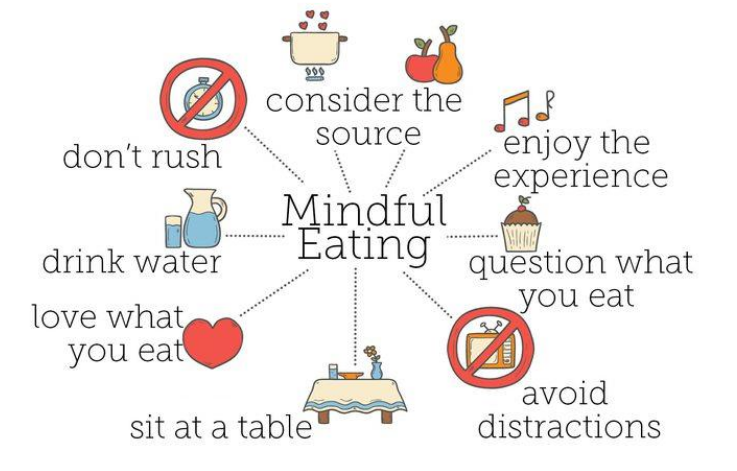During this quarantine, there are a lot of people who spent their time mostly at home. Many browse the internet and often found themselves watching YouTube videos especially those inspiring workout videos. They are really inspiring to watch but not everyone has the motivation to do the work. Mindfulness is a great alternative in losing weight, without having to exert much effort like in working out.
Mindfulness
Mindfulness is a way of being present and fully focused on whatever it is that is happening at the present moment. With mindfulness, you remove all the possible distractions around you and free yourself from it while focusing about your thoughts and feelings during meditation.
Some say that mindfulness is also a training. It is a way of training us to pay close attention to ourselves by not worrying about the challenging past, the unexpected present and the unknown future. These three things are the most common cause of stress for any individual who’s living their life.
Take note though, that mindfulness is not like Buddhism or any kind of religion. It does have a belief system and the science of mindfulness are mostly based on research. Meaning, many scientists were able to prove the benefits of mindfulness in many aspects of our lives.
Mindful Eating
There are many ways on how to practice mindfulness. You may not even realize it, but you may be doing it every day. The practice of mindfulness has a lot of different exercises. Some of which can actually help you with your weight loss. The most popular one is Mindful Eating.
The Digestive system is composed of complex processes that somehow send signals to the brain to register satiety. If a person eats too fast and overeats, these might send signals to the brain causing them to feel fullness. Being distracted while eating may also slow down the digestive process causing us to have indigestion and this might lead to us not getting enough nutrition from the food that we are eating.
Mindful Eating, also called as “intuitive eating” is when a person brings themselves on a state of awareness while eating. Mindful eating is a way of bringing your full attention on your food: how it smells, taste, the color, and even the sensations you felt while eating. It is a way of appreciating the process of eating and allowing it to enter your mind and body. Mindful Eating is not a weight-loss cure in itself, but it is a part of a bigger approach that can lead a person to eating healthy leading to their goal to lose weight.
Mindfulness and Eating

Mindfulness can actually work when you use it the right way. It may not work as much as other diet therapies, but it is one way of figuring out how to eat right. This does not only help your mind but also keeps your body fit and healthy.
1. Before eating anything: Pause and Think.
A big part of mindful eating is thinking about why you chose the food and why are you eating it. Before you start eating feel your body: Is your stomach growling? Are you attracted to your food? Can you feel your mouth salivating? Consider all of these factors before eating. Pausing prior to eating allows us to make eating more purposeful and allows us to focus more on what we are doing.
2. Take a Bite and Chew
Get a piece of that food and slowly put it on your tongue. Savor every sensation that you felt while the food was in your mouth: What does it taste? Are the flavors amazing? Does it change your mood? Did you feel the sensations flowing through your body as you chew?
Do not slurp or inhale your food in front of you. This does not only look good, but it can actually affect your digestion causing it to slow down. Also, you will miss out the different flavors and the texture of the food as you are too busy satisfying your hunger. Chewing properly is a part of mindful eating as it allows you to totally experience the process of eating itself. Make sure to completely chew your food before you swallow it.
3. Drink Water before Meals
Some researches advice people to drink water before having meals as this is also one way of preventing yourself from overeating. It is usually easy to do and eventually becomes a habit as time goes by. Also, drinking water prior to meals allows you to have some time to clear your thoughts and focus on the upcoming process of eating.
4. Choose Colorful and Flavorful Foods
The eyes not only guide us to see around us but also shows us to the wonders of life. Choosing a colorful and flavorful meal composed of unprocessed foods has a great importance in Mindful Eating. Naturally healthy and whole foods have unique flavors that you cannot get from eating processed foods.
5. Do not be distracted
If possible, close any gadgets that you have that might interfere with your meditation. You should only be able to focus on what you are eating. Also, by doing this, you will not be easily distracted, and your full attention will be on the process of eating only.
Research shows that the noise your food makes when you eat can actually influence how much food you consume. The sound can either make you eat a lot or less. People who often eat with their earphones on is prone to overeating.
6. Count to Twenty
Did you know that it takes about 20 minutes for the digestive system to actually send signals to your brain to tell it that you are full? In this small window of time, you might find yourself overeating. Consider taking a break in a buffet before getting another plate for your round two. The waiting period gives time for your body to process the food that you ate.
Everyone wants to lose weight, but we all know that it includes a lot of work before it can be achieved. Mindfulness is only one of the ways that you can use to lose weight. This should be combined with exercise can help attain your goal to be fit and fab this quarantine.


